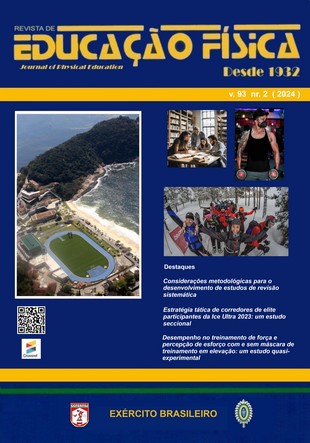Resumo
Introdução: A tríade da mulher atleta (TMA) é um espectro de distúrbios que envolve baixa disponibilidade energética (BDE), baixa densidade mineral óssea e distúrbios menstruais. A BDE, um dos três principais componentes da TMA, sendo um dos principais efeitos adversos da “deficiência energética relativa no esporte” (DER-E) sobre a saúde.
Objetivo: Apresentar considerações a respeito de métodos consistentes, novas propostas e recomendações para o gerenciamento da TMA.
Conclusão: A TMA e a /DER-E afetam um número cada vez maior de mulheres atletas e requerem um tratamento terapêutico adequado, particularmente, destacada atenção nos cuidados nutricionais. Portanto, é fundamental a cooperação de uma equipe multidisciplinar composta por médico, nutricionista, fisioterapeuta e psicólogo no acompanhamento das atletas.
Referências
Leitão MB, Lazzoli JK, Oliveira MABD, Nóbrega ACLD, Silveira GGD, Carvalho TD, et al. Posicionamento oficial da Sociedade Brasileira de Medicina do Esporte: atividade física e saúde na mulher. Revista Brasileira de Medicina do Esporte. 2000;6(6): 215–220. https://doi.org/10.1590/S1517-86922000000600001.
Horn E, Gergen N, McGarry KA. The female athlete triad. Rhode Island Medical Journal (2013). 2014;97(11): 18–21.
Dvořáková K, Paludo AC, Wagner A, Puda D, Gimunová M, Kumstát M. A literature review of biomarkers used for diagnosis of relative energy deficiency in sport. Frontiers in Sports and Active Living. 2024;6: 1375740. https://doi.org/10.3389/fspor.2024.1375740.
Yeager KK, Agostini R, Nattiv A, Drinkwater B. The female athlete triad: disordered eating, amenorrhea, osteoporosis. Medicine and Science in Sports and Exercise. 1993;25(7): 775–777. https://doi.org/10.1249/00005768-199307000-00003.
Mountjoy M, Ackerman KE, Bailey DM, Burke LM, Constantini N, Hackney AC, et al. 2023 International Olympic Committee’s (IOC) consensus statement on Relative Energy Deficiency in Sport (REDs). British Journal of Sports Medicine. 2023;57(17): 1073–1098. https://doi.org/10.1136/bjsports-2023-106994.
de Souza MJ, Nattiv A, Joy E, Misra M, Williams NI, Mallinson RJ, et al. 2014 Female Athlete Triad Coalition Consensus Statement on Treatment and Return to Play of the Female Athlete Triad: 1st International Conference held in San Francisco, California, May 2012 and 2nd International Conference held in Indianapolis, Indiana, May 2013. British Journal of Sports Medicine. 2014;48(4): 289–289. https://doi.org/10.1136/bjsports-2013-093218.
Inman KL, Hansen KA. The Female Athlete Triad - What it is and Why it is Important in Primary Care. South Dakota Medicine: The Journal of the South Dakota State Medical Association. 2021;74(10): 484–488.
Culbert KM, Sisk CL, Klump KL. A Narrative Review of Sex Differences in Eating Disorders: Is there a Biological Basis? Clinical therapeutics. 2021;43(1): 95–111. https://doi.org/10.1016/j.clinthera.2020.12.003.
Steel Z, Marnane C, Iranpour C, Chey T, Jackson JW, Patel V, et al. The global prevalence of common mental disorders: a systematic review and meta-analysis 1980-2013. International Journal of Epidemiology. 2014;43(2): 476–493. https://doi.org/10.1093/ije/dyu038.
Raj MA, Creech JA, Rogol AD. Female Athlete Triad. In: StatPearls. Treasure Island (FL): StatPearls Publishing; 2024. http://www.ncbi.nlm.nih.gov/books/NBK430787/ [Accessed 6th September 2024].
Grabia M, Perkowski J, Socha K, Markiewicz-Żukowska R. Female Athlete Triad and Relative Energy Deficiency in Sport (REDs): Nutritional Management. Nutrients. 2024;16(3): 359. https://doi.org/10.3390/nu16030359.
Purcell L, Canadian Paediatric Society, Paediatric Sports and Exercise Medicine Section. Sport nutrition for young athletes. Paediatrics & Child Health. 2013;18(4): 200–202. https://doi.org/10.1093/pch/18.4.200.
Close GL, Sale C, Baar K, Bermon S. Nutrition for the Prevention and Treatment of Injuries in Track and Field Athletes. International Journal of Sport Nutrition and Exercise Metabolism. 2019;29(2): 189–197. https://doi.org/10.1123/ijsnem.2018-0290.
Papadopoulou SK. Rehabilitation Nutrition for Injury Recovery of Athletes: The Role of Macronutrient Intake. Nutrients. 2020;12(8): 2449. https://doi.org/10.3390/nu12082449.
Logue D, Madigan SM, Delahunt E, Heinen M, Mc Donnell SJ, Corish CA. Low Energy Availability in Athletes: A Review of Prevalence, Dietary Patterns, Physiological Health, and Sports Performance. Sports medicine (Auckland, N.Z.). 2018;48(1): 73–96. https://doi.org/10.1007/s40279-017-0790-3.
de Souza MJ, Koltun KJ, Etter CV, Southmayd EA. Current Status of the Female Athlete Triad: Update and Future Directions. Current Osteoporosis Reports. 2017;15(6): 577–587. https://doi.org/10.1007/s11914-017-0412-x.
Witkoś J, Błażejewski G, Gierach M. An Assessment of the Early Symptoms of Energy Deficiency as a Female Athlete Triad Risk among the Polish National Kayaking Team Using LEAF-Q. International Journal of Environmental Research and Public Health. 2022;19(10): 5965. https://doi.org/10.3390/ijerph19105965.
Melin A, Tornberg AB, Skouby S, Faber J, Ritz C, Sjödin A, et al. The LEAF questionnaire: a screening tool for the identification of female athletes at risk for the female athlete triad. British Journal of Sports Medicine. 2014;48(7): 540–545. https://doi.org/10.1136/bjsports-2013-093240.
Coelho AR, Cardoso G, Brito ME, Gomes IN, Cascais MJ. The Female Athlete Triad/Relative Energy Deficiency in Sports (RED-S). Revista Brasileira de Ginecologia e Obstetrícia. 2021;43: 395–402. https://doi.org/10.1055/s-0041-1730289.
Maya J, Misra M. The Female Athlete Triad: Review of Current Literature. Current opinion in endocrinology, diabetes, and obesity. 2022;29(1): 44–51. https://doi.org/10.1097/MED.0000000000000690.
Holtzman B, Ackerman KE. Recommendations and Nutritional Considerations for Female Athletes: Health and Performance. Sports Medicine. 2021;51(S1): 43–57. https://doi.org/10.1007/s40279-021-01508-8.
Mountjoy M, Sundgot-Borgen JK, Burke LM, Ackerman KE, Blauwet C, Constantini N, et al. IOC consensus statement on relative energy deficiency in sport (RED-S): 2018 update. British Journal of Sports Medicine. 2018;52(11): 687–697. https://doi.org/10.1136/bjsports-2018-099193.
Lages, A. S, A. R. Rebelo-Marques, F. Carrilho. Défice Energético Relativo no Desporto (RED-S). Rev Med Desportiva; 2018.

Este trabalho está licenciado sob uma licença Creative Commons Attribution 4.0 International License.
Copyright (c) 2024 Revista de Educação Física / Journal of Physical Education
